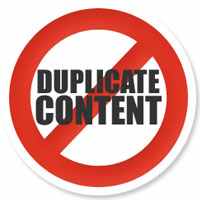But then someone reminds these people “see, you would also need content on your website!” And these people reply, “Alright, buddy, that’s not a problem! Chill out! Let others produce content, I will simply do a Ctrl+C and Ctrl+V job” And this is one of the most uninformed and bad decision one can make. Those who think that by copying content from other website –they can make their own website a money making machine; well, forget about it. This post belongs to my GOOGLE ADSENSE BIBLE (a must read for AdSense Success aspirants) By duplicating content (or scraping content as it is more commonly known as) you can make a heap of information on your website –but the problem is that you’ll hardly find any readers! Google, the almighty search engine, heavily penalizes websites that scrape content. Other search engines like Bing, Yahoo, Baidu etc. also impose similar penalties on misbehaving websites. Such penalty will push your website down the search results and that will make it difficult (or almost impossible) for users to reach your website through search. Webmasters strive for a ranking on first page of Google search result because that is the single most important way of getting search traffic for your website. More importantly, mostly it is the traffic sent by the search engines that makes you money. Therefore, it is extremely important to aim for higher Google ranking. And, duplicating content is a certain way to kill your cyber dreams. You might wonder about so many newspapers around the world publishing the same news but they don’t get penalized. See, newspaper websites are that of high-trust and high-authority websites; so Google inherently trust them that they are not duplicating information but are actually buying it from agencies like Reuters. And then these websites put up a lot of original content as well by the means of their reporters and columnists. Sometimes we come across an interesting news or an article about which we also want to write on our own website. You can safely do so but only if you add more value to the existing content AND write it completely in your own words. Google search algorithm is an intelligent software. It can see through and decide what is a genuine attempt to contribute new content to Internet and what’s a fraud. If your website has many distinct URLs pointing to the same page (here I am not talking about 301 redirection), then you could be the victim of unintentional duplication. Such duplication is not actually duplication in human eyes –but a search engine will see it as such. Please note that here I am talking about many distinct URLs and not many links. Let’s take an example. Suppose your website is www.example.com and you have 10 links within your website pointing to www.example.com/mypage.htm That’s fine! But if you’ll have www.example.com/mypage1.htm , www.example.com/mypage2.htm and www.example.com/mypage3.htm having same content –then you will be seen as duplicating content. The question is who would be stupid enough to do something like this?! Well, webmasters don’t do the above fiasco intentionally but when the website becomes larger –such issues may arise in somewhat more complicated form. Consider the following two URLs: www.example.com/mypage.php?id=244&seq=8 and www.example.com/mypage.php?seq=8&id=244 Both these URLs are pointing to the same content. The programmer, without meaning or realizing any harm, has unintentionally changed the sequence of parameters. This little thing makes these two URLs distinct in the eyes of a search engine! You should also be very careful in case of CMS (like WordPress) which provide tags and categories as alternatives for categorizing content. If you will use both of these options –you may end up having multiple URLs pointing to the same content. Well, so this is it for today! Please feel free to comment and ask me if you have a question about this subject of content duplication. Thank you for using TechWelkin. Comment * Name * Email * Website
Δ
